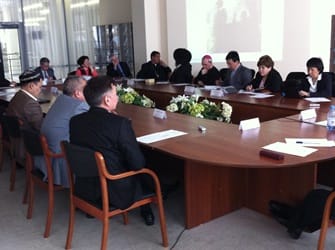IGE Holds Conference on Religion, Security and Citizenship in Kazakhstan

Washington, DC – (4 June 2013) – IGE hosted its first conference in its series, “Religion, Security and Citizenship in Central Asia” in Astana, Kazakhstan last week. The series aims to promote thoughtful discussion of how religious belief affects regional security and influences concepts of citizenship, while creating a space for dialogue on these issues between grassroots and government representatives. In attendance were representatives of the Lutheran, Catholic, Jewish and Muslim faiths, independent legal experts, research institutes such as Ansar, the Institute of World Politics and Economics, the Public Opinion Research Institute, universities such as Caspian University, Kazakhstan State University and Eurasian National University, and government agencies including the Ministry of Education and Science, the Ministry of Internal Affairs and the Agency of Religious Affairs.
With the passage of a new religion law in 2011, major changes have been taking place in Kazakhstan, yet little dialogue has occurred on the subject. The conference represented a rare opportunity to convene disparate stakeholders on issues of religion, security and citizenship. Even though these issues are growing in importance, they have not been given adequate attention. Several participants noted that such discussions are not held frequently enough, and that more interaction between government and grassroots representatives is urgently needed.
The conference itself covered topics as diverse as the role of religion in social stability, Kazakhstan’s religion policy within the context of international law, religious education and the role of the media in the public dialogue about religion. Dr. Martha Olcott of the Carnegie Endowment and Dr. Chris Seiple of IGE delivered keynote addresses.
IGE is well-positioned to build upon this foundational conference, based on over 10 years of building the capacity of government and religious leaders to discuss issues of religious freedom and participation in Southeast Asia, a region where IGE has witnessed significant movement by policy makers on these exact issues. Future conferences in this series will include a larger, region-wide conference in Almaty, Kazakhstan later this year, as well as another smaller, national conference in Tajikistan. IGE will also broaden its engagement in the region through smaller follow-on projects designed to increase awareness of the role religion plays in security and citizenship.
About the Institute for Global Engagement – The Institute for Global Engagement works at the critical intersection of religion and global affairs, building sustainable environments for religious freedom worldwide. Through local partnerships, IGE works transparently to convene, connect, and build consensus among government, religious leaders, and scholars to ensure that people of all faiths and none have full freedom of conscience and can participate as equal citizens in public life. To learn more about IGE, please watch our four minute video.